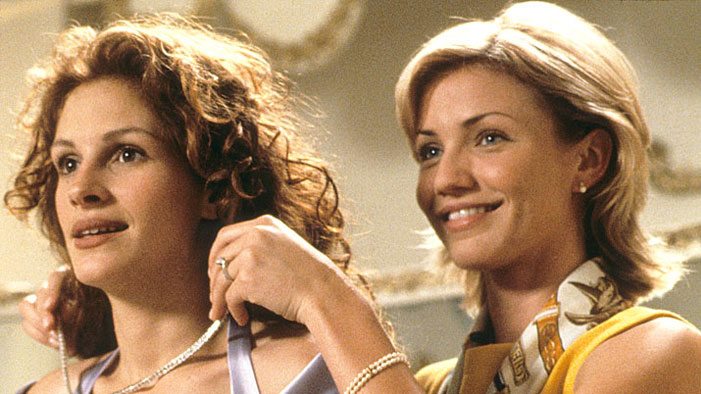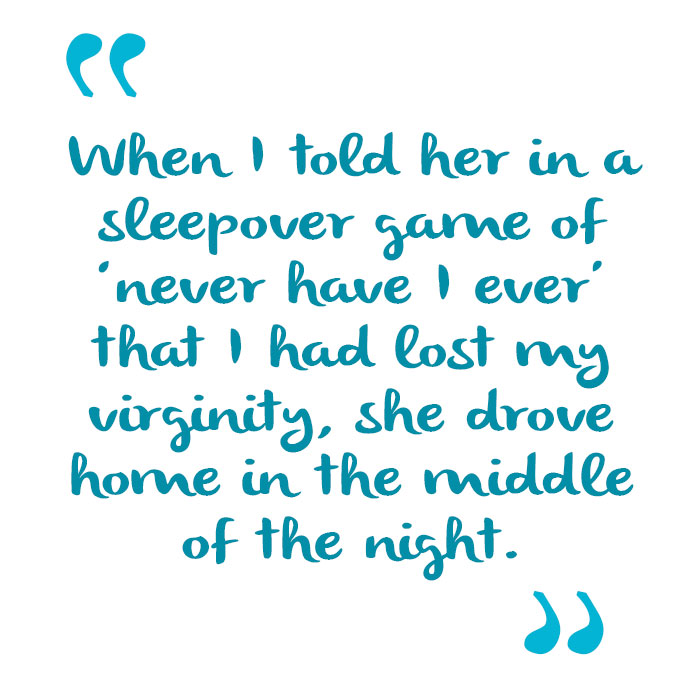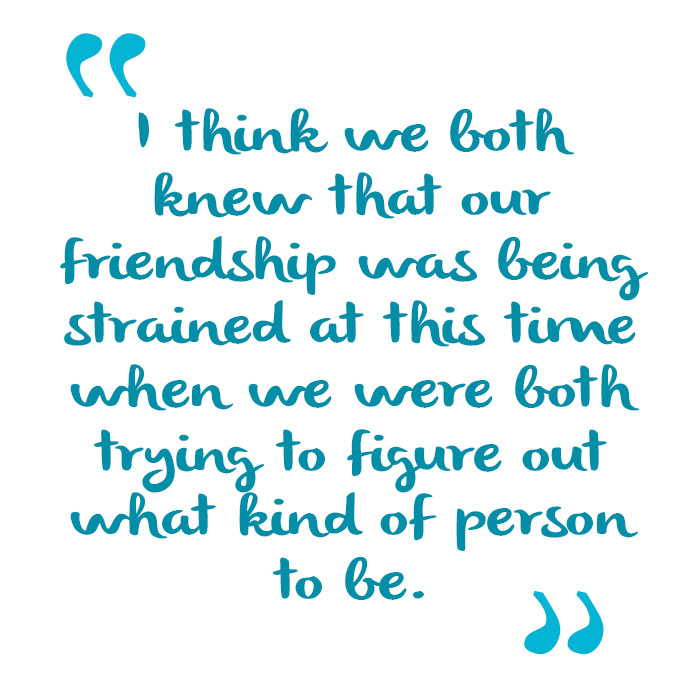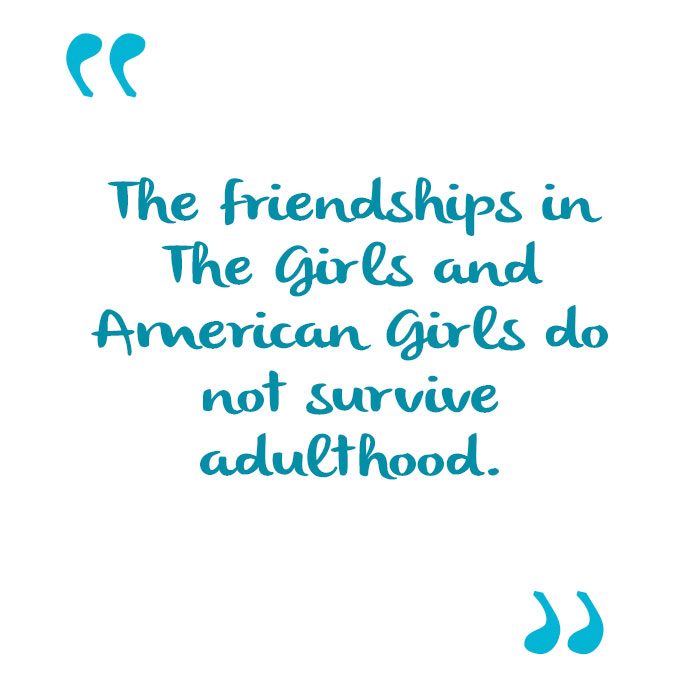Real Talk: My Best Friend and I Are Total Opposites
 My best friend Cindy and I met when we were seven and instantly gelled because we were both too old to be watching Blues Clues but did it anyway. We could make each other laugh for days. Cindy and I didn’t go to the same school, but spent every extra second together. Sometimes I think the fact that we went to different schools made us better friends, because we couldn’t take each other for granted. Her friendship was the best thing I had.
My best friend Cindy and I met when we were seven and instantly gelled because we were both too old to be watching Blues Clues but did it anyway. We could make each other laugh for days. Cindy and I didn’t go to the same school, but spent every extra second together. Sometimes I think the fact that we went to different schools made us better friends, because we couldn’t take each other for granted. Her friendship was the best thing I had.
We were wildly different. My parents had me on a looser leash; when Cindy wasn’t allowed to see an R-rated movie, I’d go with someone else. I was louder and more outspoken; Cindy was more polite. I started swearing like a sailor at a young age. Cindy would say adorable things like “Jeepers!”—she still does, and I love her for that.
These differences did not get in the way of our friendship as kids. The fact that we were so different meant we rarely met as competitors in grades, sports, boys. (She liked jocks, I liked punks.)

As we grew older, though, our differences became more prominent. I started drinking before I was 21, Cindy did not. I had way more speeding tickets, was more likely to break all the rules, and started hiking my skirt up and wearing mascara before she did. (It was a kilt at my boarding school, which Cindy did not attend.) But we still were so similar in our hearts and loved each other so much.
Still, I know that Cindy did not approve of how quickly I was growing up. She wanted us to stay the same. When I told her in a sleepover game of “never have I ever” that I had lost my virginity, she drove home in the middle of the night.
I recently wrote about Emma Cline’s The Girls and Alison Umminger’s American Girls—two stories in which the heroes veer away from their childhood besties, choosing a different path and losing that friend in the process. I can see how that happens.
Cindy and I never fought—we are from Ohio, we were a bit more passive aggressive than that—but I think we both knew that our friendship was being strained at this time when we were both trying to figure out what kind of person to be. Everyone goes through this: Are you going to be good or bad? Was Cindy the good one, and I the bad one?
Cindy always had boyfriends, and while I hung out with boys, I never committed to any of them. But I was a crucial member of every one of Cindy’s relationships. When someone dated Cindy, they knew they were getting me, too. If I could have gone to prom with her, I would have. (I always went to pre-prom, to snap pictures of her and tell her how beautiful she looked. She. Is. Beautiful.) She never once considered ditching me for a boy. Looking back, I cannot believe how severely I infiltrated her romantic relationships. But it was an obvious choice for us both at the time. Our love for each other was stronger than anything else.

After college, I followed my dream of moving to New York City, and Cindy became a science teacher. (This profession was perfect for her because she, like me, loves fart jokes and dinosaurs.) When she told me she was getting married, I was so excited for her, but I was also caught off guard. Now who was the one growing up too fast? She didn’t even ask me first! Was I getting married? I didn’t even have a boyfriend!
Eventually, I did get a boyfriend and was living with him in New York City, working all day and partying all night, falling asleep with my shoes on. And Cindy was married in a house in upstate New York, enriching the lives of middle-schoolers.
But when we were together, it was always like we were seven again. I would tell her stories about drunken karaoke and dumplings, and she would tell me about her hilarious students, her husband, her town. Nobody knew her better than I did, and vice versa. We didn’t even read the same books or listen to the same music. But being with her was always like being with the best part of myself. I always feel like I’m at home.

And then she had a baby—stop this train, I want to get off! Does this mean I have to have a baby?, I wondered.
The friendships in The Girls and American Girls do not survive adulthood. And that’s a shame. Though I went far left, and Cindy went far right, now that we are adults, we have met in the middle. We were side by side at each other’s weddings. I visit her, her husband, and her baby upstate. She is pregnant with her second. She is the best mom.
After going through all those changes with her, I know our friendship will survive. We have been tested before, and maybe we will be tested again. But something in the universe always pulls us together in the end. We talk on the phone once or twice a month, and when I hang up that phone I feel Cindy in my bones. I feel like we are underwater at the town swimming pool, blowing bubbles at each other, or racing our bikes to the tennis courts, or snuggling together in bed at night, talking about cute boys.
The last time I visited her, we were chatting and she said, “You know that episode of Mickey Mouse Clubhouse where…”
“Let me stop you a sec, before you say anything else,” I said. “I am positive I have not seen whatever Mickey Mouse Clubhouse episode you are about to reference. But I want to hear all about it.”
We are grown women, now. We’re pretty much done shaping ourselves into who we want to be and we’ve looked at each other and said, “I still love you, and I always will.” I guess that’s what real friendship is.












